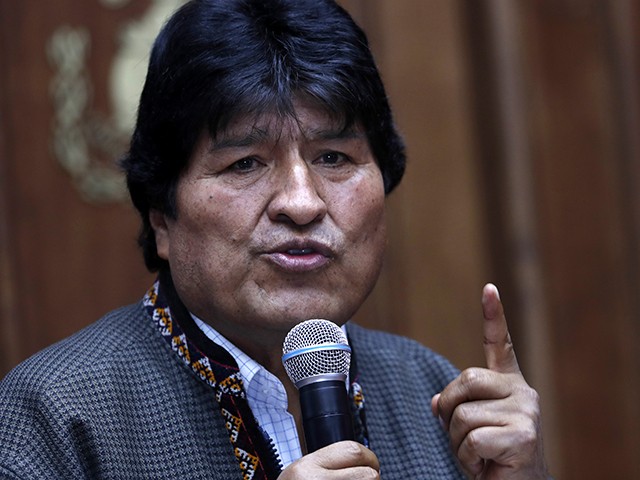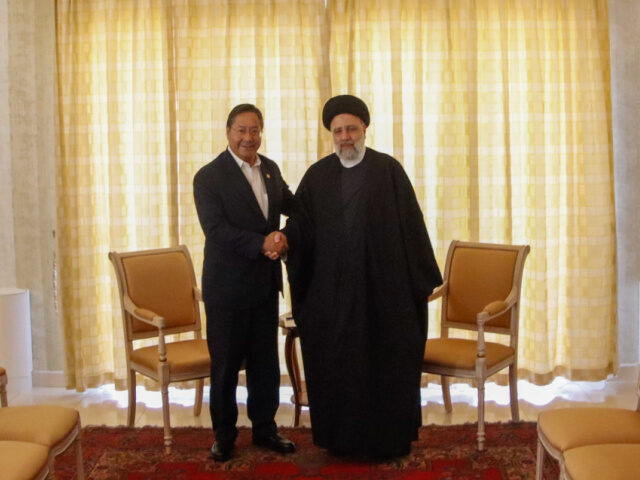Iran vowed to strengthen cooperation with Bolivia following a meeting this weekend between Iranian President Ebrahim Raisi and Bolivian socialist President Luis Arce, his “friend.”
Raisi praised Arce for the “revolutionary and anti-imperialist” positions of the Bolivian government — making special mention of Arce’s support of “Palestine” after Arce’s government cut all ties with Israel in response to Israel’s self-defense operations against the jihadist terrorist organization Hamas, which Iran funds.
“Your passionate defense of Palestine will definitely be a good support for the people of this country,” Raisi told Arce.
Raisi and Arce met on Saturday in Algeria on the sidelines of the Assembly of Heads of Gas Exporting Countries. The “strengthened” cooperation plan, according to the Iranian presidency, will cover trade, energy, technical engineering services, and agriculture.
The Iranian president also remarked that his country “has no obstacle to promote cooperation with the Bolivian government and the economic and commercial relations between the two countries should grow and develop to the extent of political interactions between them.”
Arce responded by describing the positions of Bolivia and Iran in international issues as “very close,” claiming that his government’s view of Iran is as more than a country but as a “friend and brother.”
The socialist president, who described Israel’s self-defense operations as a “genocide,” also claimed that “enemies inside and outside Bolivia launched a propaganda campaign and psychological warfare” against the country in response to his government’s decision to cut ties with Israel. Arce did not provide any examples of said propaganda or proof for his claims:
Bolivia has dramatically increased its cooperation and ties with the Iranian regime in the past decade. The increased relationship between both countries led the executive director of the Center for a Secure Free Society (SFS), Joseph Humire, to describe Bolivia as Iran’s “most successful” project in the region in the Islamic regime’s decades-long plans to spread its influence in Latin America.
Iran began deepening its influence on Bolivia in 2007, thanks to the interest of Arce’s predecessor, former socialist president and wannabe dictator Evo Morales. Although Morales is now at odds with Arce, struggling to regain control of their Movement Toward Socialism (MAS) party, this has not stopped Iran from furthering its influence in the South American country.

Bolivia’s former President Evo Morales speaks during a press conference at the journalists club in Mexico City, Wednesday, Nov. 27, 2019 (AP Photo / Marco Ugarte).
In 2023, Bolivia signed an agreement with the Islamic regime for the purchase of Iranian-made drones during the official visit of Bolivian Defense Minister Edmundo Novillo to Tehran. Novillo and his Iranian counterpart, Mohammad Reza Ashtiani, also signed an undisclosed memorandum of understanding on defense and security.
The agreement immediately drew criticism from local opposition politicians and other regional governments — including Argentina, which at the time was led by the socialist presidency of Alberto Fernández.
Local Argentine-Israeli organizations condemned Bolivia’s purchase of Iranian drones, as Iranian officials have been widely implicated in the 1994 bombing of the Argentine-Israeli Mutual Association (AMIA), where 85 people died. The AMIA bombing was the deadliest terrorist attack in the Western Hemisphere prior to September 11, 2001.
In his November 2023 report, Humire stated that Bolivia receives “nothing” from Iran’s growing partnership with the country; rather, it is the ruling MAS party that benefits from the alliance.
“MAS has been aligned with Iran since the beginning, since the time of Evo Morales. They receive a lot of support from Iran in everything related to how to use the system to stay in power,” Humire stated at the time. “Iran has advised them on how to handle the opposition, how to militarize their borders, how to arm militias. On how to position itself as a regional actor in the face of its neighbors. In that aspect Iran is important not for Bolivia, but for MAS, which has revolutionary aspects.”
Humire, in a new report published in February, explained that Iran’s growing influence is not just limited to Bolivia, but that the Islamic regime has also been able to spread its influence in Latin America as a result of the assistance of the three authoritarian regimes in the region — Cuba, Venezuela, and Nicaragua — as well as other regional leftist governments.
Christian K. Caruzo is a Venezuelan writer and documents life under socialism. You can follow him on Twitter here.

COMMENTS
Please let us know if you're having issues with commenting.